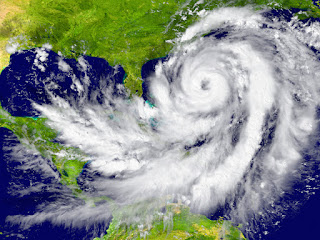2019 Hurricane Season: Predictions & Preparedness Tips!
Every Summer & Fall, we can all look forward to vacations, football season, a new school year and more. However one thing we don't look forward to, is another devastating hurricane season. All of us at Clyde Nettles want to keep you well informed, so you can remain prepared and safe heading into the 2019 hurricane season. Check out the predictions and preparedness tips below!
Hurricane Season: Quick Facts
Know the difference between a 'WATCH' and a 'WARNING'
Now that we've briefed you on the basic facts, let's take a look at what has already happened as of June 1st this year:
Tropical Storm Andrea
This subtropical storm formed around May 20th, and the following day weakened into a subtropical depression.
Hurricane Barry
July 11th, the National Hurricane Center identified a storm in the Gulf of Mexico which soon strengthened into a tropical storm with sustained winds of 50 mph. A hurricane warning was issued for parts of the coast of Louisiana. July 13th, Barry strengthened again into a category 1 hurricane as it approached the coast. Maximum winds were near 75 mph. After making landfall, Barry weakened into a tropical storm.
Future Predictions for 2019
How is the rest of the season going to pan out? Well, that is always in question, as weather patterns are not an exact science. However, we do have some predictions from the experts. Here's what they are saying:
Colorado State University Tropical Meteorology Project:
Their team is predicting a slightly below average Atlantic hurricane season. They are predicting a total of 13 named storms and five hurricanes.
National Oceanic and Atmospheric Administration:NOAA boasts a 70% accuracy of their predictions, based on weather patterns and computer models.
They are predicting 9-15 named storms, 4-8 hurricanes with 2-4 of these being major hurricanes.
The #1 Rule: Be Prepared
Remember: these are predictions only, based on weather and climate patterns. The absolute best way to go into this, or any hurricane season, is to be PREPARED. Hurricanes can affect areas more than 100 miles inland: We have family, friends and clients all over the state of SC, including the coastline. And if you think you're safe in Columbia, remember, we're only 112 miles from Charleston.
If a hurricane warning is issued for your location, take these precautions:
From all of us at Clyde Nettles, we are hoping we all have a safe and worry-free hurricane season this year. Thanks for reading, let us know if you have any questions!
Hurricane Season: Quick Facts
- The season goes from June 1st through November 30th
- Areas included: Atlantic Ocean, Gulf of Mexico and Caribbean Sea
- Hurricanes are rated 1-5 depending on the intensity of sustained winds
- Category 3 or higher is considered a major hurricane with a potential for a large amount of damage (wind gusts in excess of 110 mph)
- Hurricanes are named from six rotating lists updated by the World Meteorological Organization. Storm names are retired only when they are particularly deadly or costly.
Know the difference between a 'WATCH' and a 'WARNING'
- A watch means that a region could possibly experience hurricane conditions within 48 hours
- A warning means sustained winds of at least 74 mph are expected to hit within 36 hours
Now that we've briefed you on the basic facts, let's take a look at what has already happened as of June 1st this year:
Tropical Storm Andrea
This subtropical storm formed around May 20th, and the following day weakened into a subtropical depression.
Hurricane Barry
July 11th, the National Hurricane Center identified a storm in the Gulf of Mexico which soon strengthened into a tropical storm with sustained winds of 50 mph. A hurricane warning was issued for parts of the coast of Louisiana. July 13th, Barry strengthened again into a category 1 hurricane as it approached the coast. Maximum winds were near 75 mph. After making landfall, Barry weakened into a tropical storm.
Future Predictions for 2019
How is the rest of the season going to pan out? Well, that is always in question, as weather patterns are not an exact science. However, we do have some predictions from the experts. Here's what they are saying:
Colorado State University Tropical Meteorology Project:
Their team is predicting a slightly below average Atlantic hurricane season. They are predicting a total of 13 named storms and five hurricanes.
National Oceanic and Atmospheric Administration:NOAA boasts a 70% accuracy of their predictions, based on weather patterns and computer models.
They are predicting 9-15 named storms, 4-8 hurricanes with 2-4 of these being major hurricanes.
The #1 Rule: Be Prepared
Remember: these are predictions only, based on weather and climate patterns. The absolute best way to go into this, or any hurricane season, is to be PREPARED. Hurricanes can affect areas more than 100 miles inland: We have family, friends and clients all over the state of SC, including the coastline. And if you think you're safe in Columbia, remember, we're only 112 miles from Charleston.
If a hurricane warning is issued for your location, take these precautions:
- Research escape routes and shelters in your area
- Gather needed supplies for 3 days (water, food, medication, flashlights, batteries, etc)
- Keep important documents in a safe place or create password-protected digital copies
- Protect your property: declutter drains and gutters, consider hurricane shutters, review insurance policies
- Keep your car in good running condition and full of gas
- Bring loose, lightweight objects inside that could become projectiles in high winds
- Cover your homes windows with storm shutters or plywood
- Charge your cell phone in case you lose power
- Constantly check your area's weather alert systems for updates
From all of us at Clyde Nettles, we are hoping we all have a safe and worry-free hurricane season this year. Thanks for reading, let us know if you have any questions!






Comments
Post a Comment